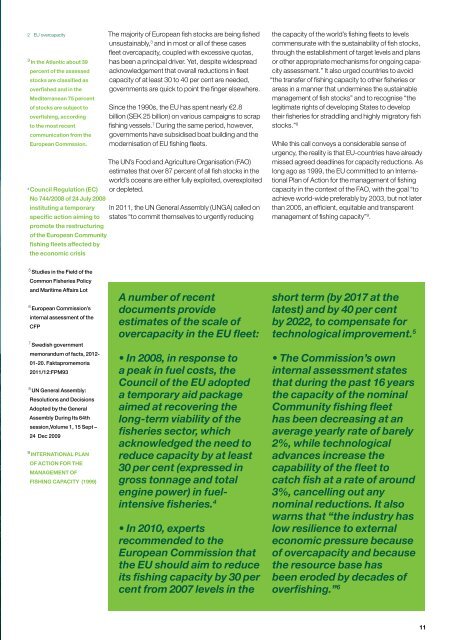"Exporting Exploitation" - "Export der Ausbeutung ... - Greenpeace
"Exporting Exploitation" - "Export der Ausbeutung ... - Greenpeace
"Exporting Exploitation" - "Export der Ausbeutung ... - Greenpeace
You also want an ePaper? Increase the reach of your titles
YUMPU automatically turns print PDFs into web optimized ePapers that Google loves.
2 EU overcapacity<br />
3<br />
In the Atlantic about 39<br />
percent of the assessed<br />
stocks are classified as<br />
overfished and in the<br />
Mediterranean 75 percent<br />
of stocks are subject to<br />
overfishing, according<br />
to the most recent<br />
communication from the<br />
European Commssion.<br />
The majority of European fish stocks are being fished<br />
unsustainably, 3 and in most or all of these cases<br />
fleet overcapacity, coupled with excessive quotas,<br />
has been a principal driver. Yet, despite widespread<br />
acknowledgement that overall reductions in fleet<br />
capacity of at least 30 to 40 per cent are needed,<br />
governments are quick to point the finger elsewhere.<br />
Since the 1990s, the EU has spent nearly €2.8<br />
billion (SEK 25 billion) on various campaigns to scrap<br />
fishing vessels. 7 During the same period, however,<br />
governments have subsidised boat building and the<br />
mo<strong>der</strong>nisation of EU fishing fleets.<br />
The UN’s Food and Agriculture Organisation (FAO)<br />
estimates that over 87 percent of all fish stocks in the<br />
world’s oceans are either fully exploited, overexploited<br />
4<br />
Council Regulation (EC) or depleted.<br />
No 744/2008 of 24 July 2008<br />
instituting a temporary In 2011, the UN General Assembly (UNGA) called on<br />
specific action aiming to states “to commit themselves to urgently reducing<br />
promote the restructuring<br />
of the European Community<br />
fishing fleets affected by<br />
the economic crisis<br />
the capacity of the world’s fishing fleets to levels<br />
commensurate with the sustainability of fish stocks,<br />
through the establishment of target levels and plans<br />
or other appropriate mechanisms for ongoing capacity<br />
assessment.” It also urged countries to avoid<br />
“the transfer of fishing capacity to other fisheries or<br />
areas in a manner that un<strong>der</strong>mines the sustainable<br />
management of fish stocks” and to recognise “the<br />
legitimate rights of developing States to develop<br />
their fisheries for straddling and highly migratory fish<br />
stocks.” 8<br />
While this call conveys a consi<strong>der</strong>able sense of<br />
urgency, the reality is that EU-countries have already<br />
missed agreed deadlines for capacity reductions. As<br />
long ago as 1999, the EU committed to an International<br />
Plan of Action for the management of fishing<br />
capacity in the context of the FAO, with the goal “to<br />
achieve world-wide preferably by 2003, but not later<br />
than 2005, an efficient, equitable and transparent<br />
management of fishing capacity” 9 .<br />
5<br />
Studies in the Field of the<br />
Common Fisheries Policy<br />
and Maritime Affairs Lot<br />
6<br />
European Commission’s<br />
internal assessment of the<br />
CFP<br />
7<br />
Swedish government<br />
memorandum of facts, 2012-<br />
01-20. Faktapromemoria<br />
2011/12:FPM93<br />
8<br />
UN General Assembly:<br />
Resolutions and Decisions<br />
Adopted by the General<br />
Assembly During Its 64th<br />
session,Volume 1, 15 Sept –<br />
24 Dec 2009<br />
9<br />
INTERNATIONAL PLAN<br />
OF ACTION FOR THE<br />
MANAGEMENT OF<br />
FISHING CAPACITY (1999)<br />
A number of recent<br />
documents provide<br />
estimates of the scale of<br />
overcapacity in the EU fleet:<br />
• In 2008, in response to<br />
a peak in fuel costs, the<br />
Council of the EU adopted<br />
a temporary aid package<br />
aimed at recovering the<br />
long-term viability of the<br />
fisheries sector, which<br />
acknowledged the need to<br />
reduce capacity by at least<br />
30 per cent (expressed in<br />
gross tonnage and total<br />
engine power) in fuelintensive<br />
fisheries. 4<br />
• In 2010, experts<br />
recommended to the<br />
European Commission that<br />
the EU should aim to reduce<br />
its fishing capacity by 30 per<br />
cent from 2007 levels in the<br />
short term (by 2017 at the<br />
latest) and by 40 per cent<br />
by 2022, to compensate for<br />
technological improvement. 5<br />
• The Commission’s own<br />
internal assessment states<br />
that during the past 16 years<br />
the capacity of the nominal<br />
Community fishing fleet<br />
has been decreasing at an<br />
average yearly rate of barely<br />
2%, while technological<br />
advances increase the<br />
capability of the fleet to<br />
catch fish at a rate of around<br />
3%, cancelling out any<br />
nominal reductions. It also<br />
warns that “the industry has<br />
low resilience to external<br />
economic pressure because<br />
of overcapacity and because<br />
the resource base has<br />
been eroded by decades of<br />
overfishing.” 6<br />
11
















